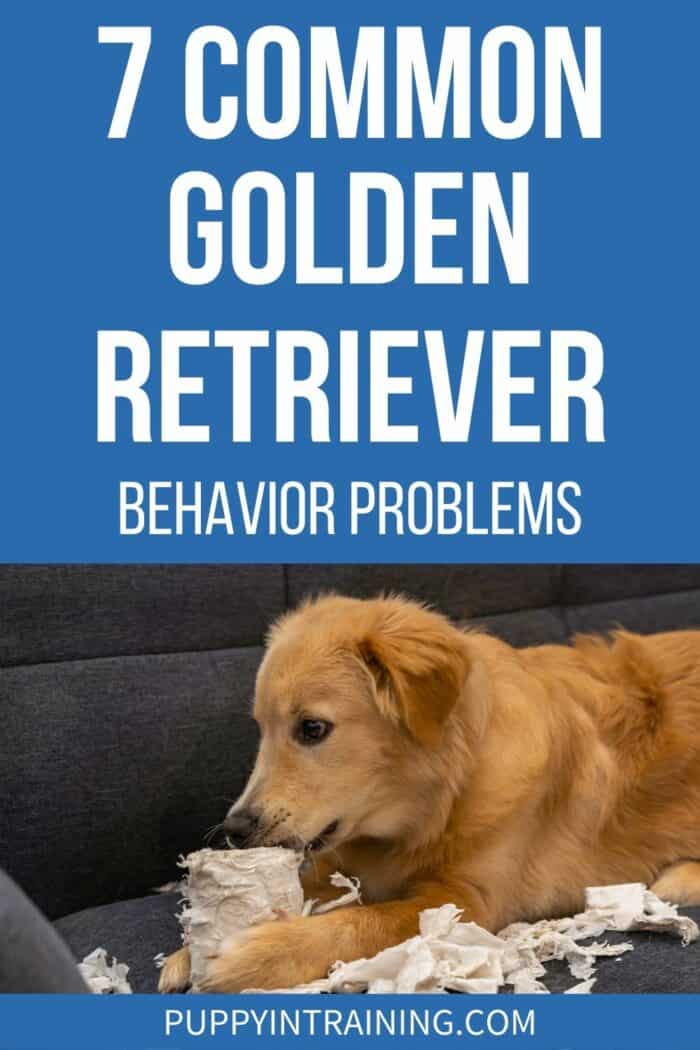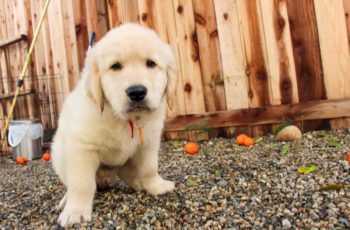This post may contain affiliate links. We may earn money or products from the companies mentioned in this post.
Golden retrievers are such great family dogs.
They’re so smart, handsome, gentle, and friendly, it’s easy to overlook some of their behavior problems.
But, like any dog, they’re not perfect. And they tend to have some behavior problems because of their great characteristics.

Most goldens want to be near their people. And they love to be petted and get attention.
And, sometimes, they’ll seek that attention in ways we don’t approve of.
They may jump, grab our hand or arm, or engage in some destructive behaviors.
In this article, I’ll deal with some common golden retriever behavior problems.
Many of these are normal dog behaviors that can be modified through training and exercise.
Normal Dog Behaviors Versus Abnormal Behaviors
Dogs naturally dig, bark, express fear in certain situations, mark territory, chase small animals, and jump.
They may steal food. Or want to be with us all the time.
Goldens were bred to be sociable, high-energy dogs. They’re bred to retrieve.
So we shouldn’t be surprised when they become pushy for attention or always have to carry something in their mouths.
My rescued golden Spencer almost always had to carry something in his mouth. So I made sure there were safe toys for him to happily tote around.
Unfortunately, many dogs are given up to shelters because of behaviors that can be modified.
Many people get a young golden and aren’t aware of all that’s involved in teaching him our rules.
Goldens are high-energy hunting dogs who don’t mature until they’re three or four years old.
To have a great companion takes a lot of work, patience, and time.
It’s up to us, as dog owners, to be aware of our dog’s drives, personality, and needs. And to meet those needs.
This article won’t cover in detail abnormal canine behaviors.
These should be dealt with by behavior specialists who can evaluate the individual dog and determine the best behavior modification plan.
And it’s always important to have your dog get a full physical from a vet when dealing with any behavior problem.
These abnormal behaviors include aggression to those around the dog, obsessive-compulsive disorders, shutting down, and severe separation anxiety.
Why Behavior Problems Develop
There is no one reason why some behavior problems occur.
It’s usually a complex mix of numerous factors. A dog’s genetic make-up can influence behavior.
If unsocialized, overly shy goldens are bred together, chances are the offspring won’t have the “golden temperament” we’ve come to expect.
Unfortunately, goldens are so popular–the third-popular breed ranked by the American Kennel Club–they are often poorly bred.
Because of overbreeding or inbreeding, many goldens don’t have the stable temperament that a well-bred golden should have.
There are too many back-yard and puppy mill dogs who are more likely to not be the examples of what the breed should be.
Other factors are:
- Poor health, illness, or pain
- No or improper socialization
- No or inadequate physical or mental stimulation
- Sudden changes in diet, routine, or placement
- Lack of or improper training
- Lack of a quiet, comforting environment
- Social isolation
- Inconsistent rules
- Abuse or neglect
So it’s important to meet our dog’s physical and mental needs to help prevent natural behavior problems from developing.
7 Common Golden Retriever Behavior Problems
Any breed of dog can develop the following behavior problems.
But, because of goldens’ natural friendliness and needs, he’s more likely to develop some problems than some other breeds are.
- Jumping on People
Golden retrievers usually love everyone and never met a stranger. But it’s this friendliness that can get them into trouble.
Goldens are the greeting committee of the dog world.
Many dogs want to jump on people when greeting them. But it’s different if a five-pound Maltese does rather than a 70-pound golden.
The golden can, of course, unintentionally injure someone, knocking them over in his exuberant greeting.
And it’s also dangerous for young children because he’ll just knock them over when he’s excited.
- Engaging in Destructive Behavior
In addition to friendliness, goldens were bred to hunt. They have energy to spare. And they were bred to retrieve and have something in their mouths.
So if we don’t meet their exercise and mental stimulation needs, they’ll find their own ways to meet them.
And generally we won’t approve of their actions.
They may dig up the garden. Or chew up our furniture.
Or they may steal the food on the counter. And the food they eat may be toxic, such as chocolate or raisins. Or they may get a blockage from ingesting a towel or sock.
A bored, under-exercised golden can get very creative in meeting his needs.
- Mouthing
Being retrievers, goldens are one of the “mouthier” breeds. They often need to have something in their mouths.
If a golden isn’t properly trained that we aren’t a chew toy or pheasant he’s retrieving, he may become very mouthy.
That is, he may constantly try to hold our clothes, arm, or hand in his mouth.
We also don’t want to become a tug toy.
Biting is a natural canine behavior. But puppies should be taught bite-inhibition.
We don’t want our dogs to progress to biting and breaking skin.
Even if he has a “soft-mouth” in which he naturally is gentle, the habit is annoying. And it can be dangerous.
Someone can be badly bruised or even pulled down.
- Pulling on the Leash
Goldens love to go places and greet all their new admirers. But they want to get there sooner rather than later.
Many dogs pull on a leash, but not all are as friendly as goldens are known to be.
And they can be lazer-focused on getting where they want to go.
Being a rather large dog, a golden pulling on a leash can injure someone. An owner can be pulled down and get injured.
Or the dog himself can get free and get lost or injured–or worse.
- Demanding Attention
Because of their natural friendliness, goldens may want to be the center of attention.
They are so family-oriented, they love to be with us.
Some goldens may bark at you for attention. They may nudge you and grab your arm to be recognized.
Some may even engage in unwanted behaviors like taking something off the table. Even negative attention is attention.
- Hyperactivity
Some goldens seemingly bounce off the walls.
They are like a hurricane passing through the living room. Tables are cleared of bric a brac. Pillows are shredded and on the floor.
But your happy golden is furiously wagging his tail, looking for the next item he can use to help expel his excess energy.
- Separation Anxiety
Because of their innate friendly, family-oriented behavior, goldens may suffer from separation anxiety at a higher rate than some other breeds.
Their need to be with us can lead to some unwanted behaviors.
Dogs with mild separation anxiety may drool, pace, whine, and generally behave in a distressed manner.
Dogs with severe separation anxiety may become very destructive.
They may try to get out of doors and windows, feverishly digging at door and window frames. They may even severely harm themselves in their attempts to get free.
Dogs with separation anxiety may need professional behavioral help.
How To Fix Common Behavior Problems Goldens May Have
There are no quick fixes for behavior problems.
But if you’re consistent in helping rectify any behavior problems, they usually can be “fixed” or managed in a successful manner.
We owe it to our goldens to do all that we can do to meet their natural needs.
A bored, untrained, under-exercised, unsupervised golden is going to develop some problem behaviors.
And he’s an unhappy golden because he won’t be leading the life he should lead and won’t be able to participate in activities that he enjoys.
Some of the tips below will even help your golden from developing any of the potential problems cited above.
I wrote the ways to help fix a problem separately from the problems because it will probably take more than one item to successfully change an unwanted behavior.
All of the favorable interactions we have with our goldens also help further our bond with them.
Physical Exercise
Goldens were bred to hunt. It’s literally in their genes.
They are highly-energetic dogs. If we don’t provide a sufficient amount of exercise for them, they’ll be very likely to engage in the above-named problem behaviors.
Walks, fetching, jogging, agility, and swimming can all be great ways to physically exercise your golden.
A vet check-up is advisable prior to starting any exercise program. And also ask your vet whether any particular training you’re planning is appropriate for your golden.
A young golden’s joints are just developing and seniors may have risk factors such as arthritis.
Physical exercise can help decrease or eliminate the above-named problems.
Of course, you want to exercise your dog enough but not over-tire them. How much is enough and what types are best will depend on your golden’s age, health, and genetic make-up.
Dogs who have been sufficiently exercised are less likely to jump or engage in destructive activities such as digging or chewing.
And they’re less likely to be hyper-active. Also, dogs who are exercised and calm before we leave are less likely to develop separation anxiety.
Obedience Training
Obedience training helps us communicate with our dogs and informs them what behaviors are desired.
A dog doesn’t know that he should sit or stand on all fours rather than jump to greet us.
They don’t know that they shouldn’t pull on a leash or attempt to get our attention in negative ways.
It’s up to us to teach them acceptable alternative behaviors.
So we can teach them to sit before they receive attention. Or to lie down next to us and settle.
And we can show him what toys he can put in his mouth rather than destroying items or turning us into his chew toy. Redirection works.
We can also teach them a “leave it” command not to take things off a counter or not to dig.
And we can teach them to not pull on a leash and to walk on a loose leash.
Part of the training should include how to leave your dog alone. This will help prevent separation anxiety from developing.
Start with short sessions. Be sure that he’s received a sufficient amount of physical and mental exercise.
Make leaving a happy opportunity–when great things appear. Leave a frozen, stuffed Extreme Kong with him as you leave.
Don’t make a fuss when you depart or when you return.
If your dog has already shown signs of separation distress, get the help of a qualified behavior specialists.
As far as your golden inappropriately seeking attention is concerned, you can ignore your dog.
Turn away or get up and leave.
But do give him the attention he needs on your terms by calling him over to you occasionally. Pet him. Have him do a command or trick. Praise, pet, and treat.
Mental Stimulation
Of course, there are many puzzle toys and treat-dispensing toys that can help expand your golden retriever’s mind and tire him out.
You should also play games with him. Teach him to tug a toy like a rope or long fleece to and give.
You can have him play fetch. Teach him how to retrieve and release the ball or other toy if he doesn’t know how already.
You can play hide-and-seek where you go and hide and call him to you. Make a big deal when he reaches you (YES! Good boy!) and give a few great treats.
Of course, don’t do this game too often. And not at all with a dog who has separation anxiety.
Socialization
All dogs should be properly socialized to new people, friendly dogs, and new situations and environments that they’ll face in everyday life. But, to goldens, this is what they often enjoy most.
Everyone is a potential friend. And they’ll thrive by proper introductions and attention from new people.
Your golden will also learn what’s appropriate behavior when you work on his commands with new people.
He should learn to calmly sit when approached and petted by a newcomer, rather than jumping or getting “mouthy.”
Structure and Routine
All dogs need structure and routine.
Goldens will thrive if they are fed the same times each day, are exercised as needed routinely, and receive attention from their people every day.
No dog should be just put aside like a statue. Goldens especially need attention through positive daily interactions–play, training, exercise.
If ignored, their sweet, golden personality will wilt. And they’ll find unwanted ways to meet their needs.
Final Thoughts
Golden retrievers are such happy, affable, family dogs. But they are prone more than some breeds to certain problem behaviors because of their genetic purpose to retrieve and their desire to be with people.
It’s important to meet their needs and teach them what behaviors are acceptable. By doing so, their lives–as well as ours–will be full and happy.
Does your golden engage in any unwanted behaviors?
How have you handled them?
Please tell us about it in the comment section below.
Save To Pinterest

Top Picks For Our Puppies
- BEST PUPPY TOY
We Like: Snuggle Puppy w/ Heart Beat & Heat Pack – Perfect for new puppies. We get all of our Service Dog pups a Snuggle Puppy. - BEST DOG CHEW
We Like: Best Bully Sticks – All of our puppies love to bite, nip, and chew. We love using Bully Sticks to help divert these unwanted behaviors. - BEST DOG TREATS
We Like: Wellness Soft Puppy Bites – One of our favorite treats for training our service dog puppies. - BEST FRESH DOG FOOD
We Like: The Farmer’s Dog – A couple months ago we started feeding Raven fresh dog food and she loves it! Get 50% off your first order of The Farmer’s Dog.
Check out more of our favorites on our New Puppy Checklist.


